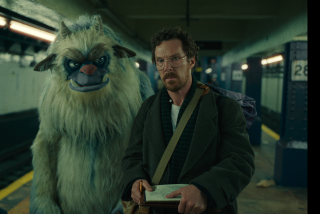Cautionary Tale in Genetically Pure ‘Gattaca’
- Share via
In the brave new world of writer-director Andrew Niccol’s “Gattaca,” genetics is God. People are designed in petri dishes, not conceived in passion. Their gene pools are swept and filtered to remove any potential of mental or physical imperfection, and they arrive in the world naked as ever but genetically dressed for success.
Not so the movie. Niccol’s script, which has the earnest simplicity of a freshman philosophy paper, is merely naked exploitation, a sci-fi snow job that projects a contemporary ethical question--would a perfect human be human?--into a solemn future where the worst-case scenario unfolds as conventional Hollywood melodrama.
According to an early title card, “Gattaca’s” future is just up the road, a stone’s throw from a cloned sheep, where the vast bulk of the population is genetically pure beyond anything ever envisioned by Hitler. Potluck babies like Vincent (Ethan Hawke), who was conceived the old-fashioned way, in a tangle of desire in the back seat of a Buick, make up the new underclass.
Ethnic differences may be a thing of the past, but science has yet to isolate the gene that causes the superiority complex, and the naturals--a.k.a., “faith babies,” “in-valids” and “de-gene-erates”--provide handy negative stereotypes. Some of them are born diseased, or disabled, or predisposed to who knows what kind of behavior.
Vincent, who has poor vision, a terminal heart defect and a meek physique, is thus the black sheep of his family. He’s an embarrassment, despite his romantic genesis, and a true weakling in the company of his young brother, Anton, whose carefully presorted genes make him taller, stronger, smarter and infinitely more employable. Sibling rivalry exists here, but it’s no contest.
At least, not until Vincent proves the film’s ad slogan, that there is no gene for the spirit, and summons the strength to beat the smug Anton so thoroughly in an endurance swimming contest that he has to save Mr. Perfect from Mr. Deep. The event calls for a rematch in the film’s ludicrous finale.
In the meantime, Vincent will assume the identity of a petri person named Jerome, an Olympic athlete (Jude Law) paralyzed in a car accident, and set out to achieve his greatest goal--to travel in space before his heart poops out.
Along the way, he’ll fall in love with a designer baby (Uma Thurman, as emotionally uninvolved as ever), who has her own cross to bear, and become the target of a murder investigation that threatens to expose him before his spaceship sails.
Good science fiction develops from premises and situations that, no matter how fantastic, seem a logical extension of where we are, politically as well as scientifically. Aldous Huxley’s “Brave New World” projected from the advancing science of 1932 a future 600 years forward where mankind is genetically bred in a cheerless utopia. The novel was commenting more on totalitarianism than science-run-amok. The same can be said of George Orwell’s “1984,” written 17 years later, on the rising tide of Cold War paranoia.
“Gattaca” has less political undercurrent than an episode of “3rd Rock From the Sun.” Niccol’s world, too close to ours by centuries, is a one-trick pony. Because the genetic engineering of flawless people now seems conceivable, he envisions a result that could only occur if we drop everything else. No drug, surgical or transplant options for Vincent’s heart? No solution to his astigmatism, other than glasses or tell-tale contacts?
This is an unimaginative, claustrophobic future, set mostly in the sleek corridors of Gattaca, the space exploration company where Vincent transforms himself from janitor to astronaut. The film’s one effective conceit is that employees are routinely and instantly identity-screened with urine, blood, saliva, skin cell and hair follicle tests, compelling Vincent to carry Jerome’s prepackaged specimens under his clothing.
The loss of a single personal eyelash, however, puts wise Detective Hugo (Alan Arkin) and his overbearing boss (Loren Dean) on Vincent’s genetic trail, and with the clock ticking toward launch time, he must summon the superior traits of his betters to squeak through.
“Gattaca” might have worked as a “Sleeper”-like comedy, where such happy inventions as the orgasm machine at least give the future a fair shake. We have to have something to look forward to. Instead, Niccol has fashioned a deadening cautionary tale; it’s far too serious to be taken seriously.
* MPAA rating: PG-13 for brief violent images, language and some sexuality. Times guidelines: none of the above done in excess.
‘Gattaca’
Ethan Hawke: Vincent
Uma Thurman: Irene
Alan Arkin: Detective Hugo
Loren Dean: Anton
Jude Law: Jerome
A Jersey Films Production, released by Columbia Pictures. Screenplay/director Andrew Niccol. Producers Danny DeVito, Michael Shamberg, Stacey Sher. Editor Lisa Zeno Churgin. Cinematography Slawomir Idziak. Music Michael Nyman. Costumes Colleen Atwood. Art director Sarah Knowles. Set decorator Nancy Nye. Running time: 1 hour, 52 minutes.
*
* In general release throughout Southern California.
More to Read
Only good movies
Get the Indie Focus newsletter, Mark Olsen's weekly guide to the world of cinema.
You may occasionally receive promotional content from the Los Angeles Times.










